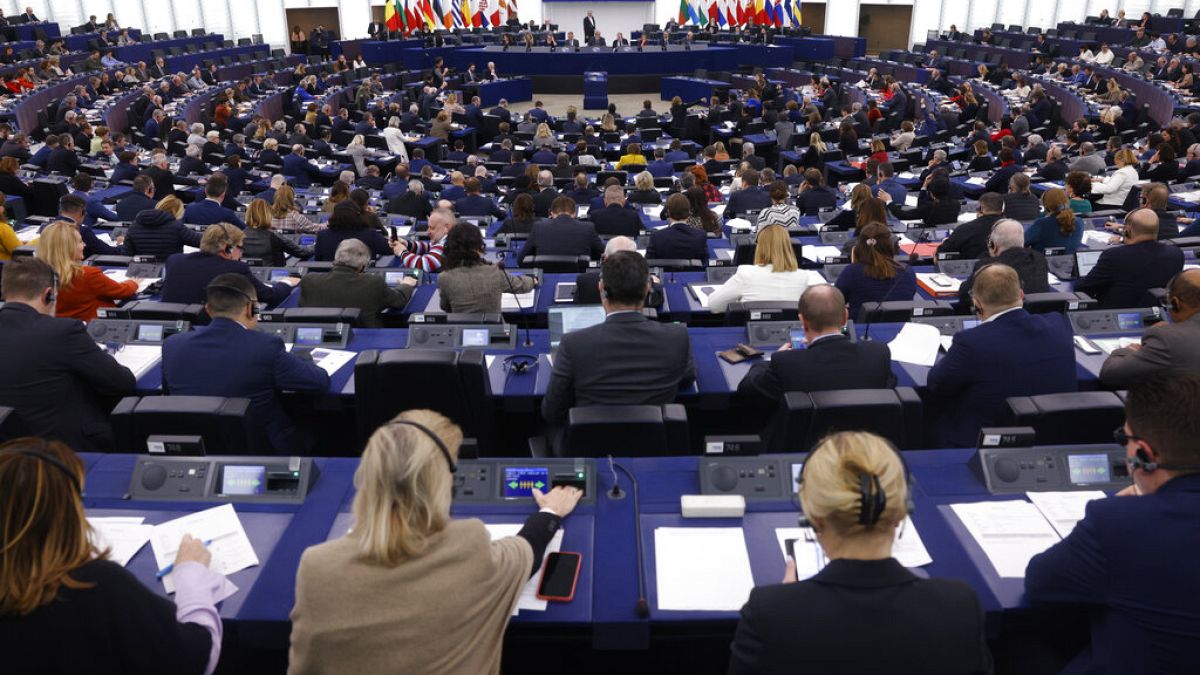Ahead of the 2024 European elections Euronews looks at the perks that come with being an MEP including a spending allowance and a golden parachute.
From an expenditure allowance to a golden parachute, there are many benefits to being a European lawmaker — but many are also conditional. Here's a list of the main perks that come with being a member of the European Parliament.
Salary
Each member of the European Parliament takes home the same gross salary, regardless of how many years they've been in office — and that amount is €10,075.42 per month as of July 2023. After taxes and insurance, the monthly total lands at €7,853.89. But for most MEPs, there's further taxing from here, as many member states require their European lawmakers to pay an additional national tax, so the final net amount depends on the MEP's home country and its taxation policy.
When comparing the wages to national lawmakers, as of April 2023 British MPs gross annual salaries equal to about £7,215 (€8,432) per month. In France, national MPs earn a monthly gross salary of €7,637 (€5,676 net) as of January 2024.
Read more | Who are the best-paid MPs in the European Union?
General expenditure
To manage office costs in their constituency, including computers, telephones, conference organising as well as office rent and supplies, a general expenditure allowance of €4,950 is budgeted per month as of January 2024. This allowance is highly controversial because the sum can be deposited directly into MEPs' personal bank accounts — and they are not required to disclose how the money was spent. Whereas MEPs must submit invoices to get reimbursed for travel expenses, the general expenditure allowance has no oversight or controls.
This doesn't look likely to change anytime soon. The European Court of Justice in September 2018 upheld the European Parliament's refusal to grant journalists access to documents relating to MEPs' general expenditure allowance spending, saying it is "an excessive administrative burden" to handle the more than four million documents for all requests.
Golden parachute
When an MEP is no longer in office, a soft landing with a golden parachute awaits if they've been in office for at least one year. European lawmakers are entitled to a transitional allowance that is the equivalent of a month's salary for each year they were in office — but for up to two years. This means a departing MEP can earn as much as €241,810 if they do not take on another role in parliament or public office. If a former MEP does take on a mandate elsewhere, their new salary will be offset against the transitional allowance.
Should the departing lawmaker take up a job in the private sector or elsewhere outside of public office, the full allowance remains — and it doesn't matter why the lawmaker has vacated their parliament seat.
"The right to transitional allowance is not only for MEPs who are not re-elected in European elections, but also for MEPs who, no matter the reason, end their term in the middle of the legislature (take another position, leave [European Parliament] )," said a European Parliament spokesperson to Euronews.
Travel expenses of over €4,000
MEPs are refunded for travel to European Parliament meetings — but only if they provide receipts. According to the Parliament website, this includes:
- up to a maximum of a business class (or similar) airfare; or a first-class rail fare; or €0.58 per km for car journeys (up to a maximum of 1000 km)
- fixed allowances based on the distance and duration of the journey to cover other costs of travelling (such as motorway tolls, excess baggage charges or reservation fees).
MEPs can be reimbursed for their travel, accommodation and related expenses up to a maximum annual amount of €4,940 for activities outside their home country.
Daily allowance
European lawmakers are given a flat-rate allowance of €350 to "cover accommodation and related costs for each day that MEPs are present in Brussels or Strasbourg on official business”. This can include hotel bills, meals and "all other expenses involved”, according to the European Parliament. MEPs are given the full allowance only if they sign a register confirming their presence.
There's just one catch: MEPs have to show up and vote. If lawmakers miss more than half of the roll-call votes when plenary voting is held, the daily allowance is cut in half to €175.
For meetings outside EU parliament, the allowance is €175 provided they sign the attendance register. Hotel bills, in this case, are refunded separately.
Budget for staff
As of July 2023, each MEP has a monthly budget of €28,696 to cover all costs involved in recruiting personal assistants, which includes their salaries and benefits. How the money is allocated is based on the hiring of up to three accredited assistants — mostly based in Brussels — though under certain conditions four can be permitted, according to the European Parliament. At least a quarter of the monthly budget (€7,174) must go toward this.
For hiring local assistants based in an MEP's member state, up to 75% of this monthly budget (€21,522) can be used.
The monthly budget can also cover trainees, paying agents, service providers that the MEP would hire, a spokesperson told Euronews.
There's one main recruitment rule when it comes to hiring personal assistants: no close relatives are allowed.
Car and office access
As is customary with many national parliaments, the European Parliament provides offices, which are located at both its Strasbourg and Brussels locations. MEPs also have access to parliament's official vehicles for official business when in either city.
Pension
MEPs qualify for a pension when they are 63. This pension equals 3.5% of the salary for each full year in office, but not more than 70% in total. The cost of these pensions comes from the European Union budget.
Medical expenses
Those with a seat in the European Parliament are eligible to be reimbursed for two-thirds of their medical expenses.
